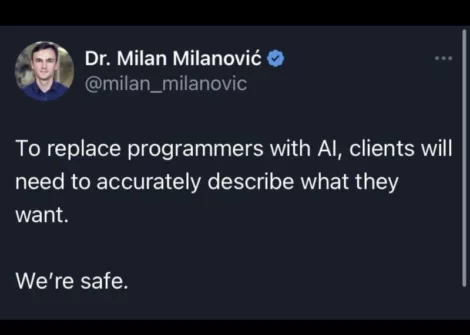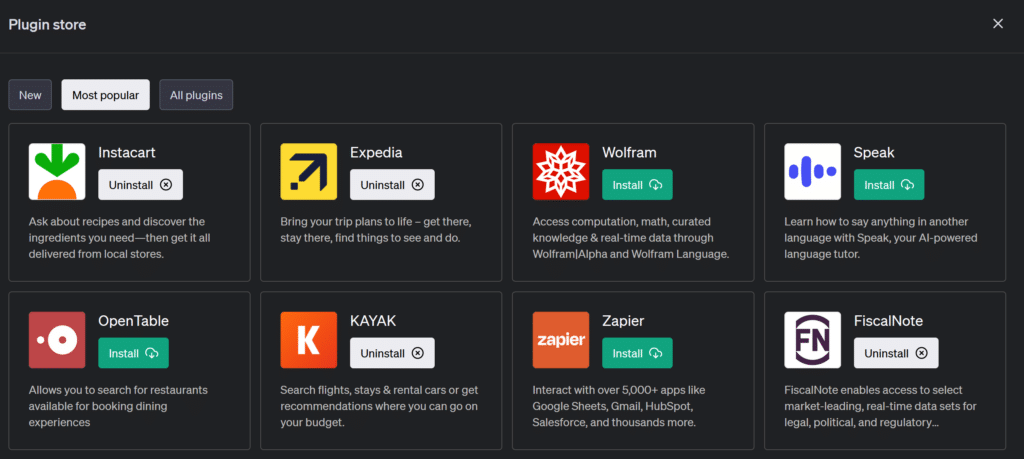In 2019, I predicted the failure of connected speakers, and in 2021 that of the metaverse. In 2023, I announced that ChatGPT would not replace Google. One thing I believe in is the power of ChatGPT plugins. LLMs (Large Language Models) are a revolution that will find its finest applications in these plugins, whose power we’re just beginning to glimpse.
ChatGPT is not a revolution
ChatGPT isn’t the revolution it’s cracked up to be. The reason is simple: habits. The human brain has evolved to be as efficient as possible. In our cerebellum, all our habits are stored and where the majority of our 4,000 daily decisions are made.
Our brain is therefore designed to “favor the shortest path” and minimize cognitive load and energy expenditure.

Using ChatGPT means “verbalizing” your request. You also have to refine it iteratively to get good results. Therein lies the weakness of generative AI. This prompted Dr. Milan Milanovic to say on Twitter that developers have nothing to fear from ChatGPT.
Others have used this sentence to show that we could be the main sticking point for generative AI.
That’s what made me say, in another article, that ChatGPT would not replace Google. Indeed, I had observed that only 10.53% of Internet searches were “verbalized,” i.e., carried out in natural language. The rest of the queries still consisted of a juxtaposition of keywords.
So, I think we’re “safe,” too until companies understand ChatGPT plugins’ value.
ChatGPT plugins are a revolution
ChatGPT plugins have been available since May 15, 2023, as a Beta version to all paying users ($20/month).
They enable you to obtain answers using a specific feature. There’s something for everyone, and some of the most interesting plugins stand alongside others of little interest. But before explaining why ChatGPT plugins are a revolution, let me explain what they are.
What are ChatGPT plugins for?
ChatGPT plugins are shortcuts. They enable you to perform a specific action while remaining in the chatbot environment and continuing to interact with GPT4, the underlying LLM (Large Language Model).
The plugin can also be understood as a series of instructions of varying degrees of complexity. They simplify the data processing by proposing a degree of automation. If all this remains abstract, it should become clearer in the following paragraph with a few examples.
ChatGPT plugins: the next app store?
Let’s note that OpenAI has dubbed its plugin library the “plugin store.” I wonder where they got that name 😂. ChatGPT plugins look much like what you’ll find on Apple or Android. “Avalara” proposes to calculate your property tax based on where you live, “Tic Tac Toe” proposes to play games, and “ArtCollection” to browse the collection of New York’s Metropolitan Art Museum. It’s simple and not very interesting.
Fortunately, some plugins propose to help you carry out more complex tasks. That’s what plugins are all about. A good ChatGPT plugin lets you automate a complex task using the full power of GPT4. Let’s take a look at a few examples.
Plugin 1: Photorealistic
“Photorealistic is a plugin that lets you easily generate prompts for MidJourney. If you’ve already tried MidJourney, you’ll know that the prompt is essential to the result and that you’ll have to modify it several times to get the desired result. This was my experience when I experimented with imaginary Louis Vuitton bags.
Plugin 2: AskYourPdf
“AskYourPDF is a plugin that lets you interact with a pdf. One of the limitations of ChatGPT is the window in which you interact. You can only type text, and the size of this text is limited. So, it would be best to have plugins to interact with external elements such as files. That’s what AskYourPDF proposes, and it’s very useful for summarizing a report or processing the data in such a file. Bear in mind, however, that using ChatGPT can be dangerous regarding data confidentiality.
Plugin 3: ChatWithVideo
“ChatWithVideo is a plugin for analyzing YouTube video content. The tool is very useful for structuring information from a video. I’ll give you a quick demonstration in the video below.
Why (some) ChatGPT plugins are disruptive
The disruptive nature of some plugins lies in the complexity of the tasks that can now be automated. Automation has been the driving force behind digitalization and efficiency gains in companies over the last 15 years. Thanks to LLMs, the limits have been pushed back, and with them, efficiency gains for companies.
Some plugins make the most of GPT4 while proposing integration with third-party applications. The disruptive nature of these plugins is maximized when the transition from GPT4 to an application is complicated and offers high-added value for the user. This is exactly the use case I’m presenting in the next paragraph.
The Instacart plugin killed Hello Fresh’s business model.
Example of a disruptive use: the Instacart plugin
The use case I present in this paragraph summarizes an extensive article on integrating recipes into food retailer applications.
E-commerce distributors know the benefits of integrating recipes into their applications. They enable them to increase the average basket (+20%) and are an excellent means of cross-selling. It works so well that some companies have positioned themselves in the niche by creating recipe applications connected to distributors’ applications. One of the leaders in this field is Jow, which processes 250,000 orders a month and has an active customer base of 1.5 million. Enough to generate 300 million Euros in sales every year.
A plugin like Instacart breaks down barriers and adds flexibility never seen before. You can now request any recipe (or even all the week’s food), customize it according to your tastes, allergies, or the ingredients you already have, and ask Instacart to prepare your order for you.
It’s always been challenging. This ChatGPT plugin killed Hello Fresh’s business model.
Even more disruptive use cases for e-commerce
It’s possible to imagine even more disruptive use cases from the previous use case. Imagine a future in which a plugin would enable you to:
- express a need
- receive suggested solutions to meet it
- request quotes from different suppliers
- compare offers
- negotiate offers directly with suppliers
- prepare a purchase order ready for signature
Today, no plugin can automate all these steps. And yet, taken individually, each of them can be processed in ChatGPT.
We’re not far from seeing certain types of exchange completely revolutionized. However, it will not always be for the better.

Final thoughts and conclusions
The plugins available in ChatGPT completely change how this tool can be used. We’ve gone from a chatbot limited by its dataset to an assistant capable of automating complex tasks.
While most of the plugins currently available offer little added value, some are heralding a revolution that e-retailers should prepare for. Certain barriers that have conditioned consumer behavior are about to come down. In the future, plugins will make it possible to simplify complex cognitive tasks and give control back to consumers, enabling them to choose in their own best interests.
However, these plugins present a major threat to “classic” retailers who fail to adopt this technology quickly enough: the threat of losing the relationship with the customer. Retailers risk losing customer relationships if consumers switch to third-party applications for online purchases. Yet it is this customer relationship that has made them so rich. On the one hand, retailers have played on loyalty and assortment to increase the average basket. On the other hand, their monopoly on customer relations has enabled them to monetize customer data for brands and advertisers. All this could well change tomorrow.
The ultimate stage in the intrusion of plugins into our lives could be their integration into the operating systems of our smartphones. Imagine what a voice assistant coupled with GPT4 could do. If Apple and Google take the plunge, they could dominate the customer relations pyramid. This would be another step towards the concentration of customer data in the hands of a few giants.
Posted in Innovation.


